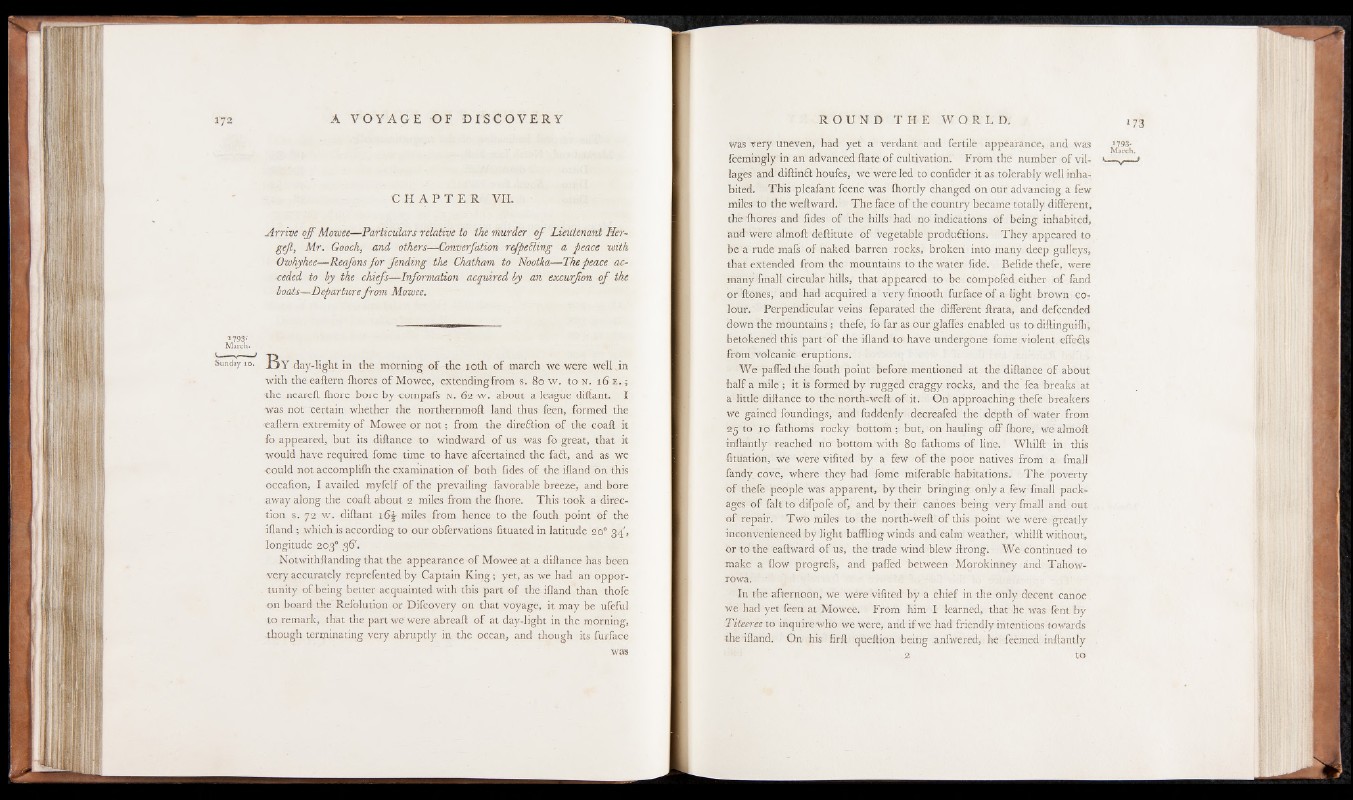
C H A P T E R VII.
Arrive off Mowee— Particulars relative to the murder o f Lieutenant Her-
geji, Mr. Gooch, and others— Converfation refpeEling a peace with
Owhyhee— Reafons fo r fending the Chatham to Nootka— The peace acceded
to by the chiefs— Information acquired by an excurjion o f the
boats—Departure from Mowee.
B y day-light in the morning o f the 10th o f march we were well Jn
with theeaftern Ihores o f Mowee, extendingfrom s. 80 w . to n . 16 e . ;
the neareft Ihore bore by compafs n . 62 w . about a league diftant. I
was not ^certain whether the northernmoft land thus feen, formed the
■ eaftern extremity of Mowee or n o t ; from the direftion of the coaft it
fo appeared, but its diftance to windward o f us was fo great, that it
would have required fome time to have afcertained the faft, and as we
•could not accomplifh the examination o f both fides o f the ifland on this
occafion, I availed myfelf of the prevailing favorable breeze, and bore
away along the coaft about 2 miles from the Ihore. This took a direction
s. 72 w . diftant 16-5- miles from hence to the fouth point of the
ifland ; which is according to our obfervations lituated in latitude 20° 34',
longitude 203° 36'.
Notwithftanding that the appearance o f Mowee at a diftance has been
very accurately reprefented by Captain K in g ; yet, as we had an opportunity
o f being better acquainted with this part of the ifland than thofe
on board the Refolution or Difcovery on that voyage, it may be ufeful
to remark, that the part we were abreaft o f at day-light in the morning,
though terminating very abruptly in the ocean, and though its furface
was
was very uneven, had yet a verdant and fertile appearance, and was ^793^
feemingly in an advanced ftate of cultivation. From the number o f vil- ullages
and diftinft houfes, we were led to confider it as tolerably well inhabited.
This pleafant fcene was Ihortly changed on our advancing a few
miles to the weft ward. The face of the country became totally different,
the Ihores and fides of the hills' had no indications o f being inhabited,
and were almoft deftitute o f vegetable produftions. They appeared to
be a rude mafs of naked barren rocks, broken into many deep gulleys,
that extended from the mountains to the water fide. Befide thefe, were
many fmall circular hills, that appeared to be compofed either of fand
or ftones;' and had acquired a very fmooth furface o f a light brown colour.
Perpendicular veins feparated the different ftrata, and defcended
down the mountains; thefe, fo far as our glafles’ enabled us to diftinguifti,
betokened this part o f the ifland to have undergone fome violent effe&s
from volcanifc eruptions.
We pafled the fouth point before mentioned at the diftance of about
half a mile ; it is formed by rugged craggy rocks, and the fea breaks at
a little diftance to the'north-weft of it. On approaching thefe breakers
we gained foundings, and fuddenly decreafed the depth o f water from
25 to 10 fathoms rocky bottom; but, on hauling off Ihore, we almoft
inftantly reached no bottom with 80 fathoms of line. Whilft in this
fituation, we were vifited by a few o f the poor natives from a fmall
fandy cove, where they had fome miferable habitations. The poverty
of thefe people was apparent, by their bringing only a few fmall packages
of fait to difpofe of, and by their canoes being very fmall and out
o f repair. Two miles to the north-weft of this point we were greatly
inconvenienced by light baffling winds and calm weather, whilft without,
or to the eaftward of us, the trade wind blew ftrong. We continued to
make a flow progrefs, and pafled between Morokinney and Tahow-
rowa.
In the afternoon, we were vifited by a chief in the only decent canoe,
we had yet feen at Mowee. From him I learned, that he was fent by
Titeeree to inquire who we were, and if we had friendly intentions towards
the ifland. On his firft queftion being anfwered, he feemed inftantly .
2 to